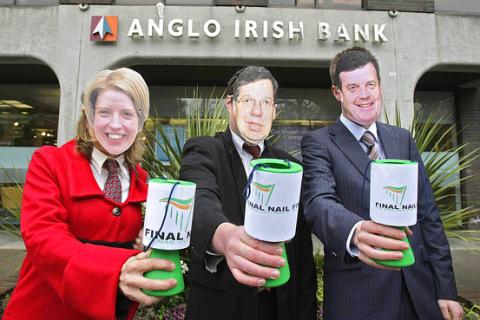Optics trump ethics in Fianna Fail heave

It was persistent questioning by Sinn Fein's Caoimhgin O Caolain in the Dail last week that wheedled out of Brian Cowen the revelations that not only did he play golf in Druids Glen with Sean Fitzpatrick in July 2008, but that he spent the evening in the company of Fitzpatrick, another senior Anglo banker and Alan Gray, a board member of the Central Bank. It was a "long-standing" engagement, Cowen said, and he took the opportunity to discuss the economy with the trio.
The hesitant nature by which the information arrived was as shady as the revelation itself. Allegations (unsubstantiated) made in the media by former Anglo boss David Drumm that Brian Cowen instructed the National Treasury Management Agency to deposit public funds with the ailing Anglo, drew calamitous attention on Cowen and Fianna Fail.
No evidence exists of Brian Cowen making this representation and indeed Michael Somers does not recall this happening. However, Michael Somers did tell the Sunday Times last week that Minister for Finance Brian Lenihan instructed him not to withdraw NTMA funds from Irish banks, and indeed to lodge more with certain banks. This caused Somers to seek legal consultation on his obligations.
Against this backdrop, social ties between the Taoiseach and executives of troubled banks – banks described as "systemic" to the country's economy – are concerning. That he defended this meeting as fulfilling a "long-standing" engagement and lent his ear to senior businessmen (for they were all men) in an unofficial setting indicates his insensibility to the optics of the occasion, let alone the propriety of it. (Add for good measure the presence of an influential member of the Central Bank.)
The unfortunate thing is that it was precisely the optics and not the ethics of the matter that caused consternation in Fianna Fail. This would be borne out several days later when the parliamentary party voted confidence in Brian Cowen as party leader. The debate on the correctness of allowing big business influence in politics was smothered by the leadership issue and 'what is right for the party'.
Given Brian Cowen's GAA prowess, a sporting analogy seems appropriate. The media dropped the ball on this; Brian Cowen picked it up and ran with it while the mainstream media entered frantic pursuit.. Leadership speculation over a weekend of consultation with every Fianna Failer in Kildare Street dominated the news. Over several days of radio and television coverage, not once was political ethics discussed (as far as this reporter saw and heard).
The message from TDs was that Brian Cowen would do right by the party. Notably the message changed once former Fianna Fail TD Jim Glennon pointed out on Newstalk that Cowen was being done a disservice by this line; Cowen would do right by the country first, party second. Henceforth the narrative was "country and party". More optics - party interests took precedence.
Fintan O'Toole's latest book, Enough is Enough: How to Build a New Republic is instructive on how TDs view their responsibilities. In Chapter 2 entitled the Myth of Parliamentary Democracy, O'Toole writes:
"When asked in an Oireachtas study how they felt a TD should vote when party policy clashes with the opinion of the party's supporters in the constituency, 86 per cent of TDs answered that the TD should vote with the party. Similarly, when asked how a TD should vote when that TD disagrees with party policy, 83 per cent indicated that the TD should vote with the party."
In Chapter 2, entitled The Myth of Representation, O'Toole outlines how TDs' view their primary role:
"TDs themselves reported in a 2010 study that they spend 53 per cent of their time on 'constituency work', and just 38 per cent of their time on legislative work. For every hour the average TD spends on legislative work, one hour and twenty-five minutes is spent on constituency-related issues. And this is, moreover, the way they see themselves. They report that they 'typically see their role as being primarily constituency representatives. They rate constituency-based activities as more important than legislative activities."
We can conclude therefore that party allegiances trump a TD's own conviction, and the party trumps both constituency representation and legislative matters, those trifling issues which least impress upon TDs.
O'Toole writes that "the tribal nature of Irish politics, with its weak commitment to ideas and its strong emphasis on group loyalty, has always discouraged [government-aligned representatives to revolt on certain issues]".
This leadership heave reveals that the survival of the political party is paramount in TDs' minds. By putting optics before ethics, by putting Cowen and the party before the issue that caused the crisis, Fianna Fail TDs effectively endorse close relations between government and big business – continuing the sort of relations that drew infamy upon the Galway Tent.
Indeed the endorsement of these relations is more disconcerting than their existence, for how can cronyism be eroded if the political will does not exist to do so?
